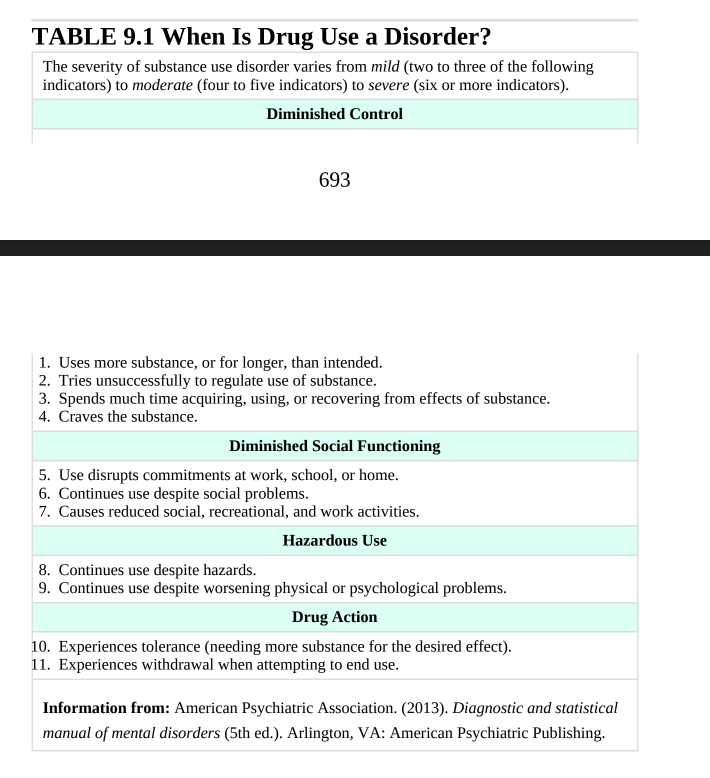Essentials of Pharmacology for Health Professions
7th Edition
ISBN:9781305441620
Author:WOODROW
Publisher:WOODROW
Chapter3: Sources And Bodily Effects Of Drugs
Section: Chapter Questions
Problem 10CRQ
Related questions
Question
(A) Do you agree that social media use/internet use has become an addiction? Why or why not?
Read through the six questions under Your Health Assets: Social Media Addiction and compare them with the eleven points in Table. 9.1 that describe the increasing severity of substance use disorder. Use one or more of these points as a springboard for your discussion.
(B) What are some things we can do to avoid or minimize becoming "addicted" to social media/internet use?
please answer both A and B

Transcribed Image Text:TABLE 9.1 When Is Drug Use a Disorder?
The severity of substance use disorder varies from mild (two to three of the following
indicators) to moderate (four to five indicators) to severe (six or more indicators).
Diminished Control
693
1. Uses more substance, or for longer, than intended.
2. Tries unsuccessfully to regulate use of substance.
3. Spends much time acquiring, using, or recovering from effects of substance.
4. Craves the substance.
Diminished Social Functioning
5. Use disrupts commitments at work, school, or home.
6. Continues use despite social problems.
7. Causes reduced social, recreational, and work activities.
Hazardous Use
8. Continues use despite hazards.
9. Continues use despite worsening physical or psychological problems.
Drug Action
10. Experiences tolerance (needing more substance for the desired effect).
11. Experiences withdrawal when attempting to end use.
Information from: American Psychiatric Association. (2013). Diagnostic and statistical
manual of mental disorders (5th ed.). Arlington, VA: American Psychiatric Publishing.
Expert Solution
This question has been solved!
Explore an expertly crafted, step-by-step solution for a thorough understanding of key concepts.
This is a popular solution!
Trending now
This is a popular solution!
Step by step
Solved in 2 steps with 2 images

Knowledge Booster
Learn more about
Need a deep-dive on the concept behind this application? Look no further. Learn more about this topic, biology and related others by exploring similar questions and additional content below.Recommended textbooks for you

Essentials of Pharmacology for Health Professions
Nursing
ISBN:
9781305441620
Author:
WOODROW
Publisher:
Cengage



Essentials of Pharmacology for Health Professions
Nursing
ISBN:
9781305441620
Author:
WOODROW
Publisher:
Cengage



Biology (MindTap Course List)
Biology
ISBN:
9781337392938
Author:
Eldra Solomon, Charles Martin, Diana W. Martin, Linda R. Berg
Publisher:
Cengage Learning

